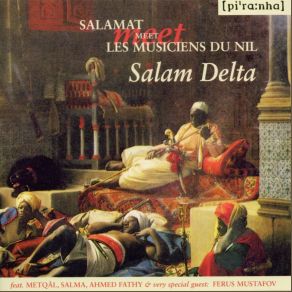Salam Delta
Download links and information about Salam Delta by Salamat. This album was released in 1995 and it belongs to World Music genres. It contains 8 tracks with total duration of 53:51 minutes.

|
|
|---|---|
| Artist: | Salamat |
| Release date: | 1995 |
| Genre: | World Music |
| Tracks: | 8 |
| Duration: | 53:51 |
| Buy it NOW at: | |
| Buy on iTunes $7.92 | |
| Buy on Amazon $7.92 | |
Tracks
[Edit]| No. | Title | Length |
|---|---|---|
| 1. | Salamat, Salamat | 9:03 |
| 2. | Ya Ghayeb | 5:11 |
| 3. | Habibi Wa Enaya | 6:43 |
| 4. | Betfout | 7:01 |
| 5. | Kadabin | 5:43 |
| 6. | El Zol Asal | 5:35 |
| 7. | Farawla | 9:27 |
| 8. | Om Ul Khair | 5:08 |
Details
[Edit]Salam Delta originated as a pan-modern Cairo musical revue assembled by Salamat leader Mahmoud Fadl for a 1994 Berlin festival. The performances so thoroughly torched audiences that Piranha decided to run the whole crew into the studio. Be glad they did, and also that the smart ass jokester aspects in the liner notes (or the presence of Hijaz Mustapha from 3 Mustaphas 3 as producer) doesn't turn up in the high-octane performances here. But solemn traditionalism doesn't rule, either — these players, drawn from Salamat, and percussion ensemble Les Musiciens du Nil, are fronted here by singers Shamandi Tewfig Metqâl, Salama Abdel Rahman, and 12-year-old prodigy Ahmed Fathy, who sound like they're having an absolute blast.
"Salamat, Salamat" opens with a very early rai feel, except these are the type of horn, accordion, and violin parts and sound the first rai guys were trying to capture via synthesizers. It's seriously rocking, nothing laid-back traditional about it, with Metqâl shouting hard while the galloping percussion drive keeps going through Salama's female vocals on "Ya Ghayeb," with its '80s rai accordion and bubbling funk basslines. Fathy's "Habibi Wa Enaya" brings the Egyptian side of Arabic pop to the fore as strings dominate a sparer arrangement supporting the near-androgynous vocals. He's a good singer, hitting his notes surely and without any tentativeness, and the fact that he's the least impressive of the three vocalists is nothing a few years of seasoning won't cure.
The best may be Salama and the blend of accordion, sax, and violin lines on "Betfout" which help to fill in another piece of the sonic puzzle — the Sudanese/Nubian music of Abdel Gadir Salim or Ali Hassan Kuban (probably the soul/R&B/funk side of the Egyptian pop equation) is that other naggingly familiar sound in the music here. "El Zol Al Asal" boasts a funky bass undertow, and the violin and vocals both hint at "Tequila" — call it "Tequila" by the Nile in Berlin with a Washington, D.C. go-go beat if you want to (or call it messing with the kid) but it's definitely big fun.
"Farawla" is the other extended feature for Metqâl with a traditional intro and low-pitched, background string drone for three minutes before percussive string riffs begin playing off the drums, vigorously driving the song forward. Salama goes more low-key trad for the closer — "Um Ul Khaur" — you can hear how the horn lines were duplicated by the synth in rai, and suddenly Messaoud Bellemou's transition role in Algerian music is easy to understand.
The best thing about Salam Delta is that all those analytical or points or musical connections within the Arab pop world pale before the sheer joy and exuberance in the music. Ain't nothing but a house party, really, a bunch of musicians with a tradition and hometown in common, thrown together for the first time, getting off and letting it rip. It would be nice to hear it happen again.